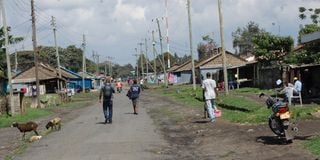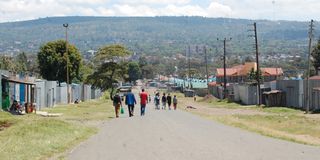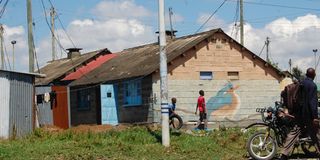Premium
Gangs and violence: Joblessness compounds Nakuru’s insecurity problem

Kivumbini estate in Nakuru town. A gang by the name ‘Confirm’ operates from the estate.
What you need to know:
- A notorious gang known as “Confirm” reigns supreme in Nakuru's Kivumbini estate.
- So daring are the gang leaders that they even recruit school children.
They are no longer the safe estates that were preferred residential areas for low-income earners in Nakuru. Kivumbini, Paul Machanga, Kaloleni, Shauri Yako, Flamingo, Ojuka, Kimathi and Manyani estates are perhaps the most dangerous in the cosmopolitan town.
They have a reputation for violent crime. Criminal gangs run the show, and the accounts from the estates are chilling.
“I was going to visit my friend at Kivumbini Estate in Nakuru East. I alighted from the matatu and was walking. Suddenly, some men approached me, two of them walked by my side and one pierced my back with a sharp object…” recalls Mr Didmus Olweny.
“I was shocked. I couldn’t scream. I was soon surrounded by hooded young men. I could see sharp knives pointed at me. The piercing intensified as they ransacked my pockets and took my valuable documents.”
This is not an isolated case in this area. Sadly, such incidents are rarely reported at the nearby Bondeni Police Station.
Notorious gang
Mr Olweny lived in this estate in the ‘60s and ‘70s and never experienced such muggings. But those were the glory days, when the town's economy was booming and jobs were aplenty. Not anymore.
“It’s wise to avoid visiting this estate after nightfall. Criminal gangs have taken over the once safe Kivumbini estate,” says Mr Olweny, a retired Kenya Railways employee.
Last December, four people were killed in the estate in a stabbing incident thought to have been started by two rival gangs. It is these same gangs, it appears, that are to blame for the increase in violent crime. Here, muggings, house break-ins and swindling of money through mobile transactions are rampant.

Kaloleni ‘C’ and Flamingo Phase Two estates in Nakuru town where most residents have fenced their houses with iron sheet due to insecurity.
A notorious gang known as “Confirm” reigns supreme here. So daring are the gang leaders that they even recruit school children. ‘Confirm’ has cells in other neighbourhoods in the town such as Kwa Rhoda and Bondeni.
In a bid to address the problem, the Nakuru County Assembly, in conjunction with national government and other stakeholders, such as Mid Rift Human Rights Network, has drafted a Peace Bill that will be tabled this year.
Unemployment
“We shall have a council at the county level made up of all stakeholders on peace issues and will have representatives at the village, ward, sub-county and county levels headed by the County Commissioner because that is where people are and matters of insecurity affect them,” offers Kabazi MCA Peter Mbae.
Dr Mbae says selected elders will be trained on peace and conflict issues and how to engage the council on early warning signals.
But what motivates young people to join these gangs? Unemployment and bureaucracy while applying for Youth Development Fund has led many to such misadventures.
“I never imagined that after my university education, I would join a gang. I once tried to apply for Kazi Mtaani job but failed due to corruption. I saw my colleagues living luxurious lives and that is how I was lured to ‘Confirm’,” says Pato, a former Criminology student at a public university.
Dr Mbae says the county must move from the management of violence to prevention. The chairman of the security of committee in the assembly, Stanley Karanja, says poverty is what drives the youth to crime.
Youth radicalisation
“Nakuru will soon become a city and as leaders, we must ensure it remains a hub for investment by coming up with the legal framework that will train more peace ambassadors to stem the rising violence amongst the youth,” says Mr Karanja, also the Naivasha East MCA.
Nakuru County Chief Officer in charge of Public Service, Training and Devolution, Paul Githinji Kinyanjui says peace is the bedrock of the development of the county and the youth must be part of that engagement.
“If we don’t engage our youths in our social, political and economic development agenda, we are likely to fail as a county and country,” he offers.

Flamingo Phase One estate in Nakuru town.
Nakuru Governor Lee Kinyanjui says his government is committed to supporting the initiatives to end youth radicalisation and violence in the low-income areas.
“As Nakuru gears up to become a city, security is key to attract investors both local and international and my government is committed to working with key stakeholders to address issues of violence and extremism among the youths,” offers Mr Kinyanjui.
White Eagles gang
Mr Njenga Miiri from the National Counter Terrorism Centre notes that Nakuru town occupies a crucial place in the development of the country as it leads to Western Kenya and the Great Lakes Region.
The government is revising the national strategy for countering violent extremism launched in 2016 to ensure it’s anchored in the security infrastructure.
Nakuru County Commissioner Erastus Mwenda Mbui says the government has put in place measures to arrest the situation.
In Naivasha, the administrator’s eyes are firmly on a gang called White Eagles.
“These gangs are a security threat to investors and the government is determined to flush them out. We know who is funding ‘Confirm’ and the government is prepared to secure Nakuru from crime,” offers Mbui.





